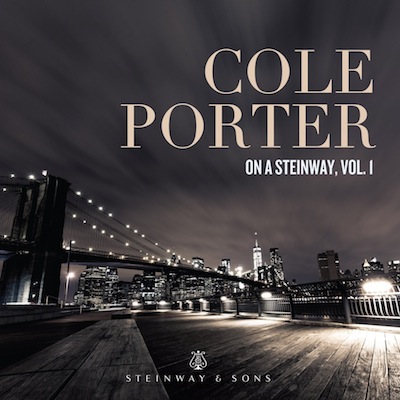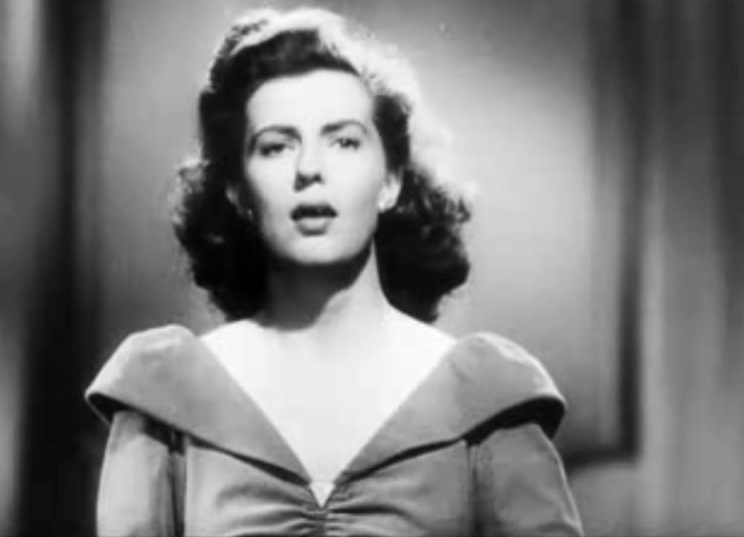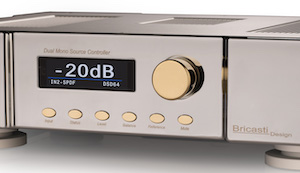
Cole Porter on a Steinway, vol. 1

Various: Cole Porter on a Steinway, vol. 1
Solo-piano transcriptions of show tunes by Cole Porter
Steinway & Sons catalog number 30116
Release date: December 6, 2019
Recorded at Steinway Hall, New York City, July 2014-April 2019.
Well, here’s a real winner!
Steinway & Sons’ piano recordings—especially the ones that they themselves produce and engineer at the new Steinway Hall performance and recording facility in New York City—are of reliably superb audio quality. That said, I hasten to point out that Steinway’s releases that were not recorded in Steinway Hall are often (but not always) just as good in terms of sound quality; they are merely “different.”
I think that the Steinway recordings made at the Shalin Liu performance hall in Rockport, Massachusetts are objectively as “good” as the Steinway Hall ones. Subjectively, I have a (slight) personal preference for the slightly more distant and bloom-y sound of Shalin Liu. If anyone prefers the slightly more in-focus Steinway Hall sound, I will not lose any sleep.
I also must point out that the sonic differences I am noting (and such is the case with many audio differences) are minor; they might not reveal themselves to casual listeners who only give a casual listen.
By this point, Steinway has released well over 100 CDs. Not all of them have totally won me over to their artistic standpoints (of course, such are matters of taste, and you are free to disagree). But… when the stars and planets line up as they do here… Wow!
This collection of solo-piano treatments of famous Cole Porter show tunes (by three different pianists, Adam Birnbaum, Jed Distler, and Simon Mulligan) presents, in spot-on high-resolution (24/96) sound, standout Cole Porter interpretations that range from the wistful and pensive to the liltingly bouncy. All delivered via sloshingly-full buckets of piano technique and always with a refined musical taste that might have made Cole Porter smile.
You can hear the entire album right now, at no charge via Steinway Streaming.
Cole Porter on a Steinway, Vol. 1 goes on sale December 6, 2019 (downloads only; mp3 on Amazon; 24/96 FLAC on HDTracks).
More pensations, and sound samples, after the jump.

I think that there is a risk (or, perhaps, more than one risk) involved whenever one sets out to produce an album of Great American Songbook songs for solo piano. Or perhaps even it is not a case of “risk,” but rather, that the nature of the outcome is not preordained (and neither is the quality of the outcome).
What do I mean by that?
There’s a genre of compact discs, I am told, that are produced for competitive ballroom dancers or competitive figure skaters to dance to or to skate to. If you think about it, it should be obvious that such performances feature a very steady, very obvious beat, with no surprises in the music. (Of course, top-tier dancers and skaters can afford to have music recorded for them to suit the ebb and flow of their programs.)
Such recordings do serve a purpose, and perhaps ballroom dancers can listen to them for pleasure. But most of us would find the metronomic regularity to be at cross-purposes with conveying the meaning of the song. Which is a bit of an uphill battle anyway, seeing as solo-piano versions of Great American Songbook songs omit the words… .
Therefore, I think that in terms of results, there is a spectrum where, at the Plain-Vanilla end of it, the piano performances are, in effect, Music-Minus-One recordings that budding or would-be singers could use for accompaniments. At the opposite end of that spectrum, there is so much embellishment, improvisation, and even outright re-composing, that sometimes it takes a delicate archeological-excavation job to determine what the underlying song is (or was).
Which brings to mind a favorite story that I heard decades ago. Supposedly, it’s a true story.
A young conservatory graduate could not find work in New York City, but did not want to relocate. So he ended up playing solo piano in an upscale restaurant noted for its “all-Mobbed-up” clientele. He quickly learned enough of the kind of “standards” that would appeal to that crowd; things like “Volare,” “Torna a Surriento,” and “Ciao, Ciao Bambino.” And Puccini opera pastiches, of course.
The recent grad was playing something from that little songbook, and really stretching out and improvising, grooving on his own music to the point that he had closed his eyes, when suddenly, the music stopped. And, just as suddenly, his hands hurt. He opened his eyes. A Mafia strongman had quietly approached and had lowered the piano’s fallboard onto the pianist’s hands, and then pressed down.
The tough guy, now that he had the young pianist’s full attention, quietly uttered the deathless phrase:
Enough with the DiMaggios; just play the tune.
Too good to fact-check, we ink-stained wretches murmur.
Now, for those for whom that unintentional humor was opaque: the music-theory term for a chord that is played not all at once vertically, but played one note at a time up, and then often, down, like this:

is “arpeggio,” from the Italian word for “harp.” Arpeggios are an easy way to stretch out or embellish a chord. The mob guy got it nearly right, but ended up on the family name of a couple of famous post-WWII Italo-American professional baseball players (one of whom was, for a time, married to Marilyn Monroe).
So, how many DiMaggios are enough, and how many are too much?
That’s for you to decide, and Cole Porter on a Steinway, vol. 1 gives you a variety of approaches to prefer.
Silly me, I had no idea that well-regarded music critic Jed Distler was a professional pianist at all, let a phenomenally talented and tasteful one. Let’s hear more from him, Mr. Steinway, please.
Distler is on the more pensive and mellow side of the ledger, while Adam Birnbaum (a recipient of the American Pianists Association’s Cole Porter Fellowship in Jazz) and Simon Mulligan are somewhat more showy; but they never lose touch with the melodies.
The running time for this album (of 45 minutes) might seem a trifle short, but I think that it works out well. There are 12 tracks; the tracks run from 2 minutes 35 seconds to 5 minutes 21 seconds, so there is no “filler” content, no stretching out in order to kill time. The music does not wear out its welcome. This release will be followed by at least a couple additional volumes.
Highest recommendation for sound, performance, and programming.
If you have been listening to Ella Fitzgerald’s Cole Porter Songbooks for, oh, perhaps the last 40 years: when Cole Porter on a Steinway, vol. 1 comes out, just buy this recording, and have a great time with it.
Sound bytes:
1. Track 5: “In the Still of the Night” (Distler)
2. Track 11: “Easy to Love” (Distler)
3. Track 3: “Just One of Those Things” (Birnbaum)
4. Track 4: “I Love You” (Birnbaum)
5. Track 2: “You Do Something to Me” (Mulligan)
6. Track 12: “Ev’ry Time We Say Goodbye” (Mulligan)(ending)
# # #



WHAAAT?! Downloads only, huh?
We’ll see about that. I’ll burn a disc in hell before I submit to this computer imperative.
Meanwhile, John Marks, thanks for another informative and useful (to some) article.
But speaking of song books, I’ve been wondering lately, is there a Great French Song Book as well? La vie en rose. Les trois cloches. Lavande bleue (dilly dilly). Here’s a classic dilly: https://m.youtube.com/watch?v=rVuKLxx-ETY
I have played more music off this Steinway stream than I have ever before. I am also totally surprised at the high quality (IMHO), since I play the piano (poorly) I do know what a great piano sounds like. I had to chance to play the Horowitz Steinway after his passing as it made the travel to numerous Steinway dealers. The touch was way to light for me as I need more key resistance to stop me from playing the wrong notes. My problem not Steinway’s.
This seems to be some of the best recorded piano sound I have ever heard regardless of a stream or not. The playing is superb.
John, I can’t thank you enough passing along this info as it will bring me years of enjoyment and keep me wishing I was well off enough to own a Steinway.